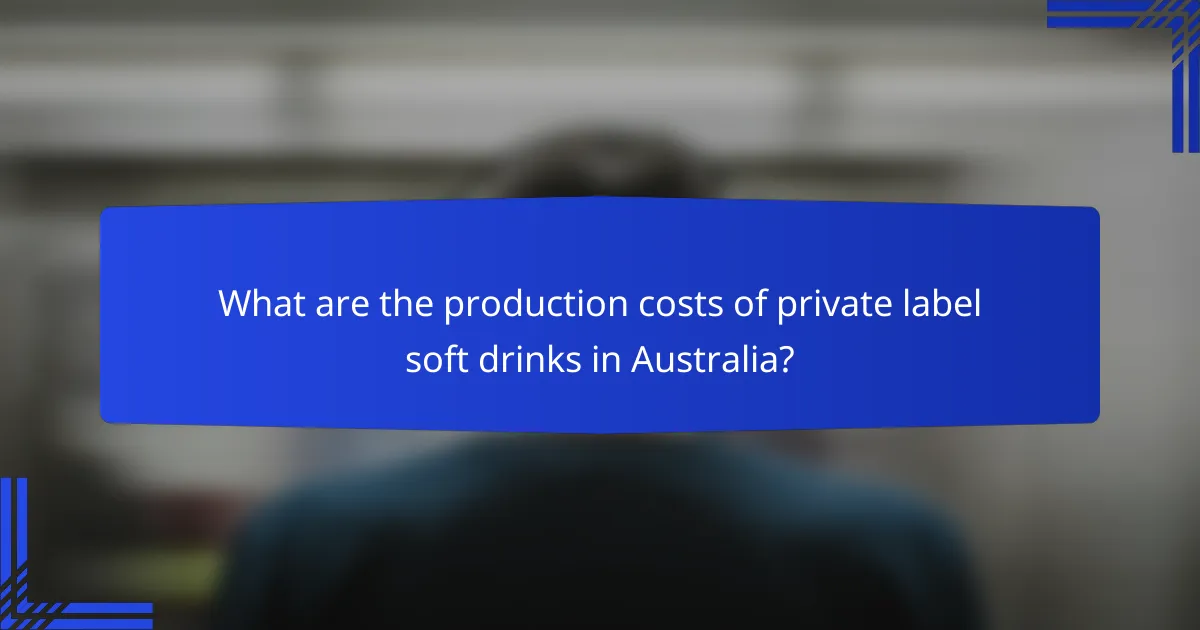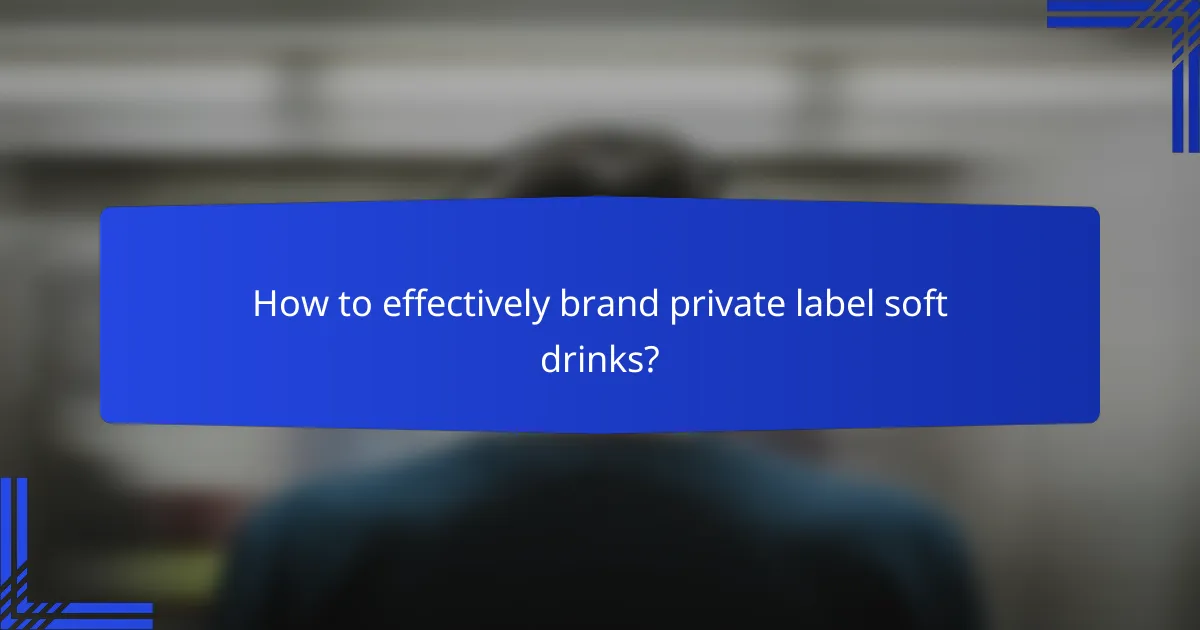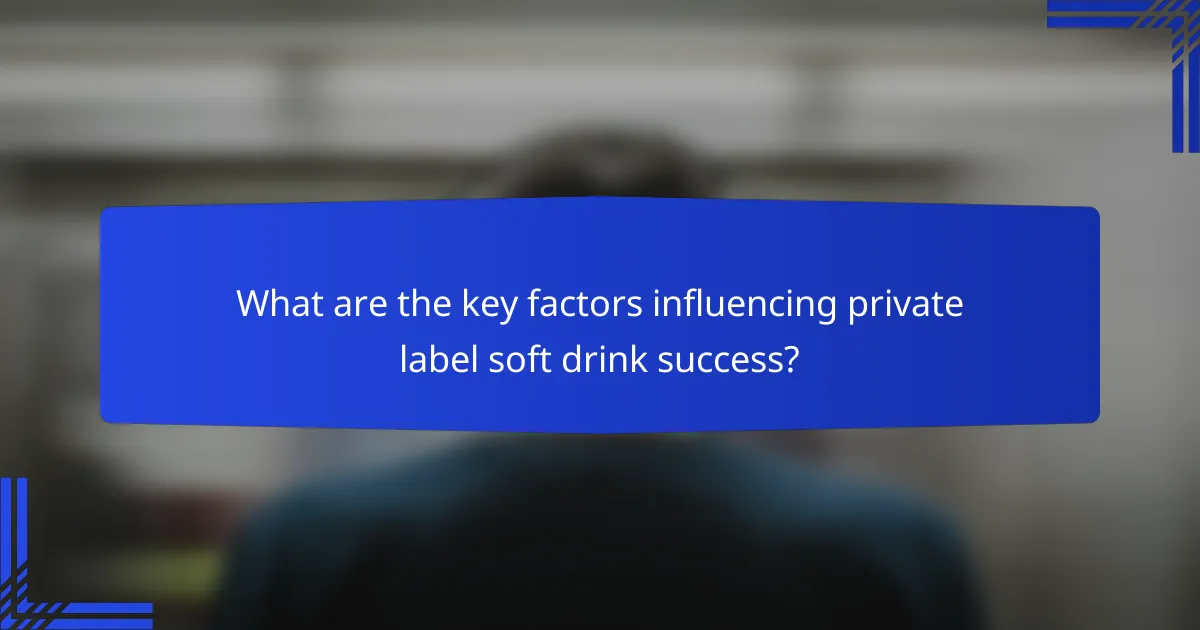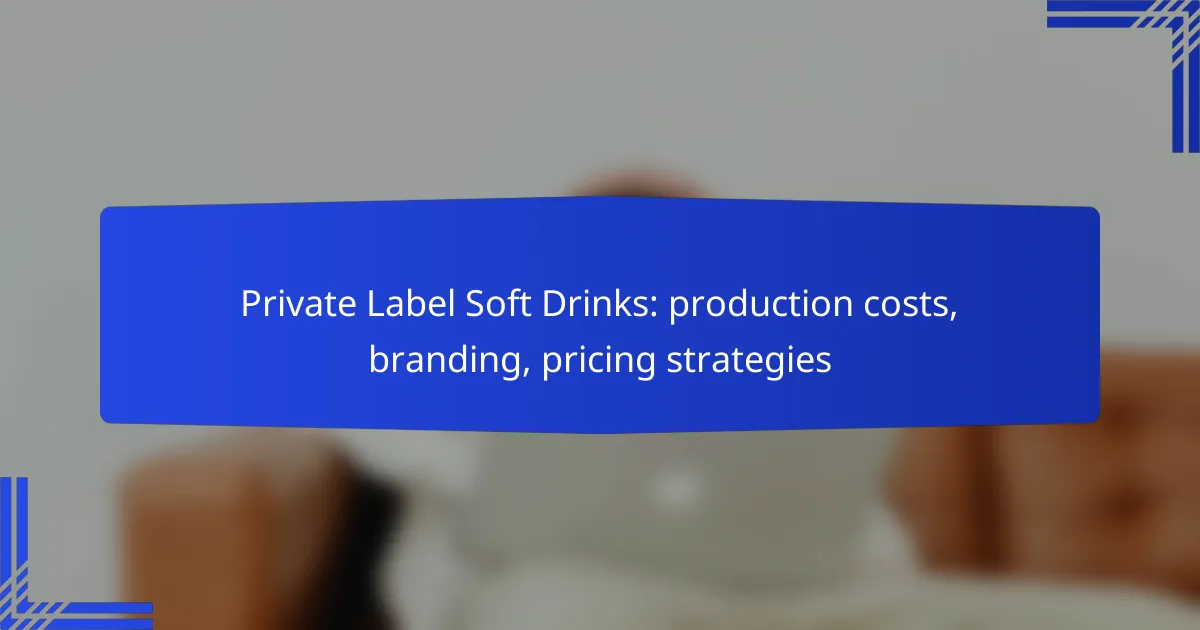Private label soft drinks present unique opportunities and challenges in the beverage market, particularly in terms of production costs, branding, and pricing strategies. Understanding the various factors that influence production costs is crucial for developing effective pricing models and creating a compelling brand identity that stands out to consumers. By strategically navigating these elements, businesses can enhance their market positioning and profitability.

What are the production costs of private label soft drinks in Australia?
The production costs of private label soft drinks in Australia can vary significantly based on several factors, including ingredient sourcing, manufacturing, packaging, distribution, and regulatory compliance. Understanding these costs is essential for effective pricing and branding strategies in a competitive market.
Ingredient sourcing costs
Ingredient sourcing costs involve the procurement of raw materials such as sweeteners, flavorings, and carbonation agents. In Australia, these costs can fluctuate based on market demand and the quality of ingredients chosen. For example, using natural sweeteners may increase costs compared to synthetic alternatives.
When sourcing ingredients, consider local suppliers to reduce transportation expenses and support the local economy. Establishing long-term relationships with suppliers can also lead to better pricing and reliability.
Manufacturing expenses
Manufacturing expenses encompass the costs associated with production processes, including labor, equipment, and facility overhead. In Australia, these costs can be influenced by the scale of production; larger batches typically reduce per-unit costs.
Investing in efficient manufacturing technology can help lower expenses over time. It’s crucial to balance quality and cost, as cutting corners may affect the final product’s appeal and safety.
Packaging and labeling costs
Packaging and labeling costs are vital for branding and consumer appeal. These expenses include the design, materials, and printing of labels and containers. In Australia, sustainable packaging options are gaining popularity, which may come at a premium but can attract environmentally conscious consumers.
Choosing the right packaging can impact shipping costs as well. Lightweight materials can reduce overall freight expenses, while eye-catching designs can enhance marketability.
Distribution and logistics expenses
Distribution and logistics expenses cover the costs of transporting the finished product to retailers or consumers. In Australia, these costs can vary based on distance, transportation methods, and fuel prices. Efficient logistics planning can significantly reduce these expenses.
Utilizing local distribution centers can minimize transportation costs and improve delivery times. Consider partnering with established logistics providers to streamline operations and reduce overhead.
Regulatory compliance costs
Regulatory compliance costs involve adhering to food safety and labeling regulations set by Australian authorities. These costs can include testing, certifications, and potential fines for non-compliance. Understanding the legal landscape is crucial for avoiding costly penalties.
Investing in compliance from the outset can save money in the long run. Regular audits and staying updated on regulations can help maintain standards and ensure product safety, which is essential for consumer trust.

How to effectively brand private label soft drinks?
Effectively branding private label soft drinks involves creating a distinct identity that resonates with consumers while ensuring visibility in a competitive market. This requires a strategic approach to brand identity, packaging design, marketing, and retailer partnerships.
Creating a unique brand identity
To establish a unique brand identity for private label soft drinks, focus on defining the brand’s mission, values, and target audience. Consider what differentiates your product from others, such as flavor profiles, health benefits, or sustainability practices.
Utilizing storytelling can enhance brand identity. Share the origin of the ingredients or the inspiration behind the flavors to connect emotionally with consumers. This narrative can be a powerful tool in building loyalty.
Designing appealing packaging
Packaging plays a crucial role in attracting consumers to private label soft drinks. Use vibrant colors and eye-catching designs that reflect the brand’s identity and appeal to the target demographic. Consider eco-friendly materials to attract environmentally conscious buyers.
Ensure that the packaging clearly communicates essential information, such as ingredients and nutritional facts, while maintaining an aesthetically pleasing look. A well-designed label can significantly influence purchasing decisions.
Leveraging social media marketing
Social media marketing is vital for promoting private label soft drinks. Utilize platforms like Instagram and Facebook to share engaging content, including product images, promotions, and customer testimonials. Regular interaction with followers can build a community around the brand.
Consider running targeted ad campaigns to reach specific demographics. Collaborating with influencers can also expand your reach and enhance credibility, making your brand more relatable to potential customers.
Building partnerships with retailers
Establishing strong partnerships with retailers is essential for the success of private label soft drinks. Approach retailers with a clear value proposition that highlights how your product can enhance their offerings and attract customers.
Negotiate favorable shelf placement and promotional opportunities to increase visibility. Regular communication with retail partners can help in understanding market trends and adjusting strategies accordingly, ensuring mutual growth.

What pricing strategies work for private label soft drinks?
Effective pricing strategies for private label soft drinks include cost-plus pricing, competitive pricing analysis, value-based pricing, and promotional pricing tactics. Each approach has its own advantages and considerations that can influence profitability and market positioning.
Cost-plus pricing model
The cost-plus pricing model involves calculating the total production cost of the soft drink and adding a markup percentage to determine the selling price. This method ensures that all costs are covered while providing a consistent profit margin.
When using this model, it’s essential to accurately assess all costs, including ingredients, production, packaging, and distribution. A common markup in the beverage industry can range from 20% to 50%, depending on market conditions and competition.
Competitive pricing analysis
Competitive pricing analysis focuses on setting prices based on what similar products are offered in the market. This strategy requires thorough research of competitors’ pricing to ensure that your private label soft drinks remain attractive to consumers.
Consider factors such as brand positioning and product quality when employing this strategy. If competitors are priced at $1.50 for a similar beverage, pricing your product between $1.30 and $1.70 can help capture market share while maintaining perceived value.
Value-based pricing approach
The value-based pricing approach sets prices based on the perceived value of the product to the consumer rather than solely on costs. This strategy requires understanding customer preferences and how much they are willing to pay for specific features or benefits.
For instance, if your private label soft drink is marketed as organic or low-calorie, consumers may be willing to pay a premium price, potentially 10% to 30% higher than standard options. Conducting surveys or focus groups can help gauge consumer willingness to pay.
Promotional pricing tactics
Promotional pricing tactics involve temporarily reducing prices to stimulate sales or attract new customers. This can include discounts, buy-one-get-one-free offers, or limited-time promotions that create urgency.
While effective for boosting short-term sales, it’s crucial to ensure that promotional pricing does not erode brand value or lead to consumer expectations of lower prices. Setting clear objectives for promotions and measuring their impact on overall profitability is essential for success.

What are the key factors influencing private label soft drink success?
The success of private label soft drinks hinges on various factors, including market demand, consumer preferences, and strong retailer relationships. Understanding these elements can help brands position themselves effectively in a competitive landscape.
Market demand analysis
Market demand analysis involves assessing consumer needs and preferences in the soft drink sector. Brands should analyze sales data, market trends, and demographic shifts to identify opportunities for growth. For instance, the rising demand for healthier beverage options can guide product development.
Conducting surveys and focus groups can provide insights into consumer behavior, helping brands tailor their offerings. Additionally, monitoring competitor performance can reveal gaps in the market that private labels can exploit.
Consumer preferences and trends
Understanding consumer preferences is crucial for private label soft drinks. Trends such as low-sugar, organic, and functional beverages are gaining traction among health-conscious consumers. Brands should adapt their product formulations and marketing strategies to align with these evolving tastes.
Engaging with consumers through social media and feedback channels can help brands stay ahead of trends. Offering limited-edition flavors or seasonal products can also create excitement and drive sales.
Retailer relationships and shelf space
Strong relationships with retailers are vital for securing shelf space for private label soft drinks. Brands should focus on building partnerships that emphasize mutual benefits, such as promotional support and exclusive product offerings. Effective negotiation can lead to better placement in stores, enhancing visibility.
Additionally, understanding the retailer’s target market can help brands tailor their products to fit specific store demographics. Regular communication and collaboration on marketing initiatives can further strengthen these relationships, ensuring long-term success.

What are the challenges in producing private label soft drinks?
Producing private label soft drinks involves several challenges that can impact quality, supply, and marketability. Key issues include maintaining quality control, navigating supply chain disruptions, and overcoming brand recognition hurdles.
Quality control issues
Quality control is crucial in soft drink production, as consumers expect consistent taste and safety. Variations in ingredients or production methods can lead to discrepancies that affect product acceptance. Implementing strict quality assurance protocols and regular testing can help mitigate these risks.
It’s essential to establish relationships with reliable suppliers to ensure ingredient quality. Regular audits and compliance with food safety standards, such as HACCP, can further enhance product reliability.
Supply chain disruptions
Supply chain disruptions can significantly impact the production of private label soft drinks. Factors such as ingredient shortages, transportation delays, and fluctuating costs can lead to production halts or increased expenses. Diversifying suppliers and maintaining buffer stock can help alleviate these issues.
Monitoring global market trends and geopolitical factors is also crucial. For instance, changes in trade regulations or tariffs can affect ingredient availability and pricing, necessitating agile responses from producers.
Brand recognition hurdles
Building brand recognition for private label soft drinks can be challenging, especially in a market dominated by established brands. Effective marketing strategies, such as targeted promotions and social media engagement, can enhance visibility and consumer trust.
Offering unique flavors or health-oriented options can differentiate private label products from competitors. Collaborating with retailers for in-store promotions can also boost brand awareness and encourage trial among consumers.
